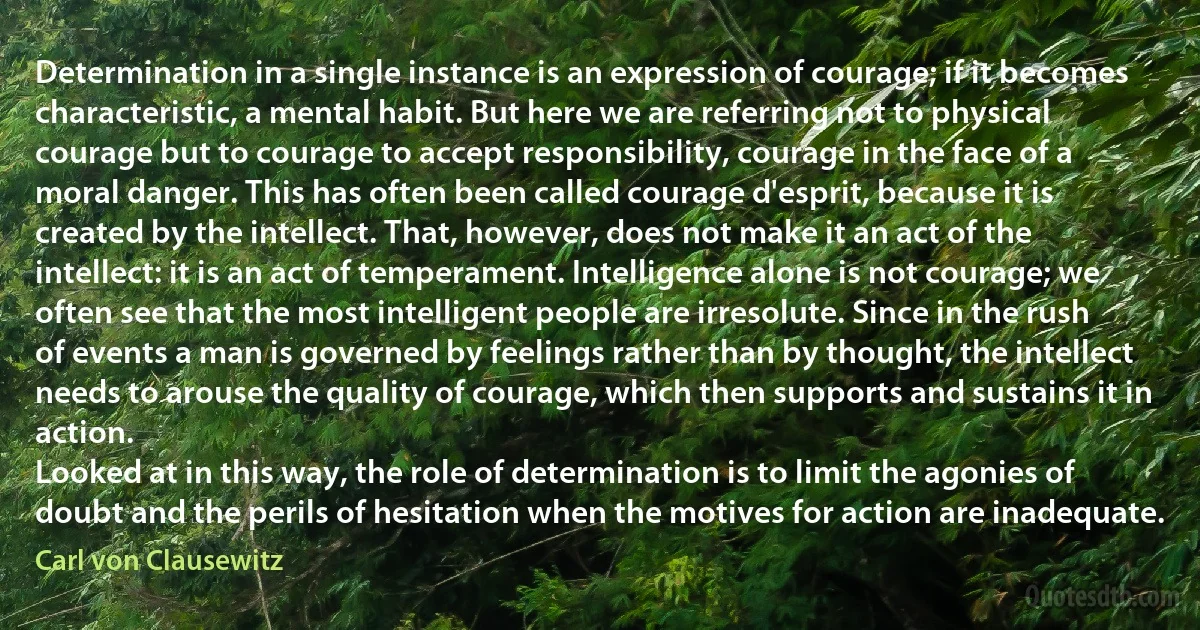
Determination in a single instance is an expression of courage; if it becomes characteristic, a mental habit. But here we are referring not to physical courage but to courage to accept responsibility, courage in the face of a moral danger. This has often been called courage d'esprit, because it is created by the intellect. That, however, does not make it an act of the intellect: it is an act of temperament. Intelligence alone is not courage; we often see that the most intelligent people are irresolute. Since in the rush of events a man is governed by feelings rather than by thought, the intellect needs to arouse the quality of courage, which then supports and sustains it in action. Looked at in this way, the role of determination is to limit the agonies of doubt and the perils of hesitation when the motives for action are inadequate.
Carl von ClausewitzRelated topics
act action characteristic courage danger doubt face habit instance intelligence man needs people quality rush see single thought wayRelated quotes
He was referring, of course, to the gentleman employed by Henry Luce and you will note, at once, the slightly unpleasant and combative tone of the salesman but there is also so much glee contained in it, an anticipation of the joys of a difficult battle, that even a person of fine scruples, sensitive to the vulgarity of the salesman type (such as yourself, Professor) need not be offended but rather challenged by the contradiction contained herein, i. e. that this crass aggression can co-exist with an ability to draw very fine moral distinctions and to see, very objectively, the damage his father's business was doing to the fauna of the country he loved and that, further - like real estate for instance - it was one of those great Australian enterprises that generate wealth while making nothing new.

Peter Carey
A white man's government? Not a government of intelligence, of justice, of virtue? Not a government by the consent of the governed, but a government of complexion? Where reason is skin deep? Who is a white man? Is a Spaniard? Is a Creole? Is an octoroon? Ohio says that a blood mixture of half-and-half will do for her. But if you have a qualification for the enjoyment of equal rights which vast numbers of our population cannot by nature satisfy, it is as if you made it depend upon a man's height or the color of his hair. You ask us to prefer a system of accidents to one of principles. You ask us to agree that a worthless, idle, drunken rascal, whose face might possibly be white if it could ever be washed clean enough, may be more safely trusted with political power, than an honest, intelligent, sober, industrious colored citizen.

George William Curtis
There was only the choice between Communism and Hitler, and I will tell you why Hitler won. People will not give up religion, rights, freedom of personality, the opportunity to develop by individual effort - which includes private property. And the other reason for Hitler's winning is that if a whole people is treated as the Germans were, everyone will say, 'Are we worse people than others? Are we of a minor race?' Just as every single individual needs and must have self-respect, just as every family is proud of decent traditions, so every nation wants to maintain her individual manner, culture, language, and customs. It was in these respects that Communism failed. The Communists said that God was nonsense and stupidity and preached internationalism without maintaining the natural national feelings of a nation.

Hjalmar Schacht
"No man is an island - " Much as we may feel and act as Individuals, our race is -a single organism, always growing and branching -which must be pruned regularly to be healthy.
This necessity need not be argued; anyone with eyes can see that any organism which grows without limit always dies in its own poisons. The only rational question is whether pruning is best done before or after birth.
Being an incurable sentimentalist I favor the former of these methods -killing makes me queasy, even when it's a case of "He's dead and I'm alive and that's the way I wanted it to be."
But this may be a matter of taste. Some shamans think that it is better to be killed in a war, or to die in childbirth, or to starve in misery, than never to have lived at all. They may be right.
But I don't have to like it -and I don't.

Robert A. Heinlein
The advent of the Computer age has stimulated a rapid expansion in the use of quantitative techniques for the analysis of economic, urban, social, biological and other types of systems in which it is the animate rather than in dominant role. At present, most of the techniques employed for the analysis of humanistic, i.e., human centred systems are adaptations of the methods that have been developed over a long period of time for dealing with mechanistic systems, i.e., physical systems governed in the main by-the laws of mechanics, electromagnetism, and thermodynamics. The remarkable successes of these methods in unraveling the secrets of nature and enabling us to build better and better machines have inspired a widely held belief that the same or similar techniques can be applied with comparable effectiveness to the analysis of humanistic systems.

Lotfi A. Zadeh
